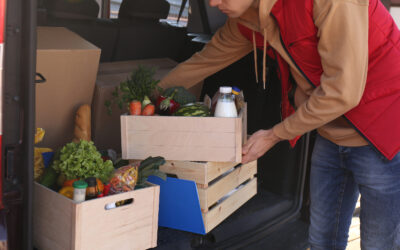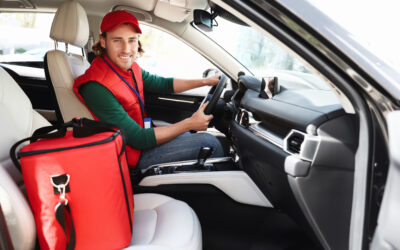Many food and cannabis delivery service providers mistakenly believe their employees are fully covered on the road through commercial auto insurance or the employees’ personal auto policies — but that’s not the case. If a business hires drivers who use borrowed, rented, or personal vehicles for food or cannabis deliveries, they risk exposure to potentially significant liability claims if the driver is involved in an accident while on the job.
To protect your business from crippling costs associated with work-related car accidents in borrowed or rented vehicles, it’s essential to consider Hired and Non-Owned Auto (HNOA) insurance. In this blog post, we’ll delve into what HNOA insurance is, what it covers, and its crucial role for food and cannabis delivery business owners.
What Is Hired and Non-Owned Automobile Insurance?
HNOA insurance is a specialized liability coverage designed for businesses that use “hired” (rented) or personal vehicles for work-related tasks — like visiting clients, making sales calls, picking up supplies, or delivering products.
Let’s say, for example, your bakery hires an employee or contractor who drives a rented or personal vehicle to deliver your baked goods. The driver accidentally injures someone or damages another vehicle during a delivery run. HNOA insurance steps in to cover costs for things like repairs, medical bills, or legal expenses.
HNOA policies typically offer coverage for two types of vehicles:
- Hired vehicle coverage: ensures your business is protected when you or your drivers operate rented, leased, or borrowed vehicles for work tasks.
- Non-owned automobile coverage: protects drivers who use their personal vehicles for work tasks. HNOA insurance offers additional, much needed coverage beyond a driver’s personal auto policy.
What Does HNOA Insurance Cover?
Picture this: One of your delivery drivers jumps into his personal car, carrying a load of cannabis deliveries for half a dozen customers. His routine delivery run unexpectedly turns into a rush-hour pileup when he accidentally rear-ends the fancy red sports car in front of him, smashing the fender and giving the other driver whiplash. What should have been a straightforward trip and simple transaction becomes a costly web of auto repairs, medical bills, and legal ramifications.
While businesses that own their work vehicles rely on commercial automobile insurance, independently contracted delivery drivers or employees that use their own vehicles are usually only insured by their personal automobile insurance. MiniCo Senior Vice President and Program Manager John Ware explains, “A personal auto insurance policy, as the name implies, is personal — not business. Coverage typically does not extend to work-related incidents. Even though a delivery driver uses his own vehicle, covered by a personal auto policy, if he causes an accident while driving for your business, you could be left to cover the costs.” In the case of our example, the business would be responsible for the sports car owner’s fender repairs and medical costs, as well as legal expenses if the sports car driver sues.
If delivery drivers use their own cars or rented/borrowed vehicles, HNOA insurance safeguards businesses from losses frequently associated with car accidents.
- Property Damage: Car accidents can be financially devastating to all parties involved — even a fender-bender can leave a business on the hook for costly repairs. If your driver is at fault in an accident, HNOA covers damage to the other person’s car. It does not, however, cover damage to the vehicle your employee was driving — that may fall under a personal or commercial auto policy.
- Bodily Injury: HNOA provides financial protection for medical costs for any injuries sustained by the other driver. In the example above, HNOA coverage would cover the sports car driver’s trip to the doctor and physical therapy costs to address the whiplash caused by the accident. If your driver, however, was injured in the accident, HNOA does not cover those medical expenses — that would fall under workers’ compensation coverage, depending on whether the driver is an employee or contractor.
- Liability Lawsuits: Additionally, HNOA coverage assists in funding legal defense if the business is taken to court for damages. If your driver was the one at fault, it shields the business in the event of lawsuits for injuries inflicted upon another individual.
HNOA for Food and Cannabis Businesses
Although any business that uses rented, borrowed, or personal vehicles for business should consider HNOA coverage, there are HNOA programs crafted with specific industries or business types in mind. MiniCo’s exclusive Hired & Non-Owned Auto for Food/Cannabis Couriers, for instance, can be written for the unique needs and challenges of businesses involved in delivering food or cannabis products:
- Food Delivery Services: Some businesses — such as pizza restaurants — hire employees or independent contractors who use their own personal vehicles to deliver food from the restaurant to customers.
2. Food Couriers: Unlike a restaurant that delivers its own food, food couriers are businesses that use employees or independent contractors to pick up food from multiple restaurants and deliver to customers using their own personal vehicles. (Think: Uber Eats, DoorDash, and Postmates.)
3. Cannabis Couriers: Cannabis businesses are on the rise, and many of them rely on employees or independent contractors who use their own vehicles to deliver cannabis orders to customers.
HNOA: Don’t Drive Off Without It
HNOA coverage is an essential element of risk management for businesses that use rented or personal vehicles for work-related tasks. MiniCo’s exclusive, monoline Hired and Non-Owned Auto program is designed specifically for food and cannabis delivery services that use drivers’ personal vehicles. Our program is written on paper rated A+ (XV), and you can trust our knowledgeable, in-house underwriters to provide fast quotes with competitive rates. Contact MiniCo Senior Vice President and Program Manager John Ware (john.ware@minico.com) for more information and to get a quote.
As always, you can find more industry insights, coverage explanations, and agent advice by visiting the MiniCo blog.


